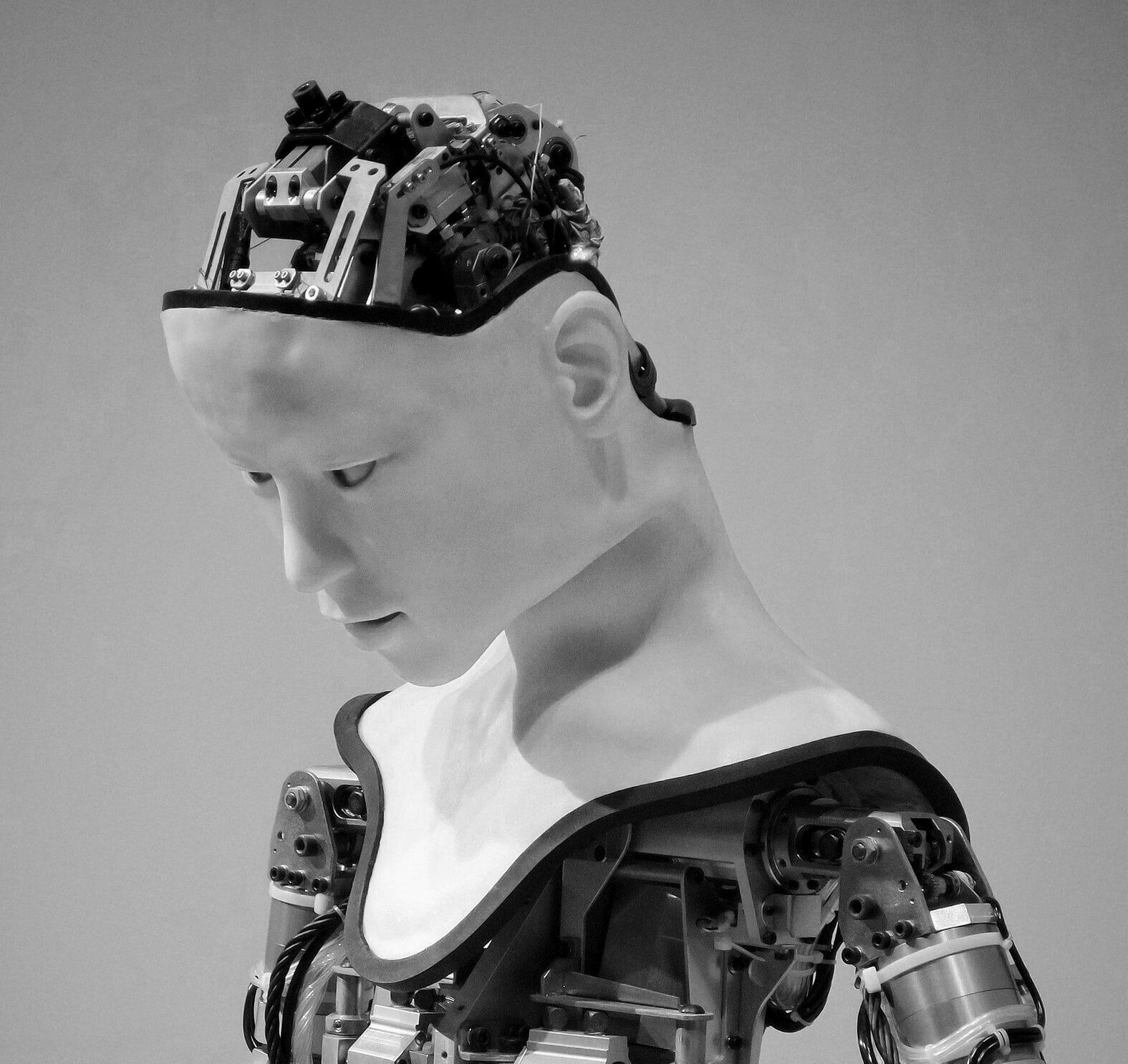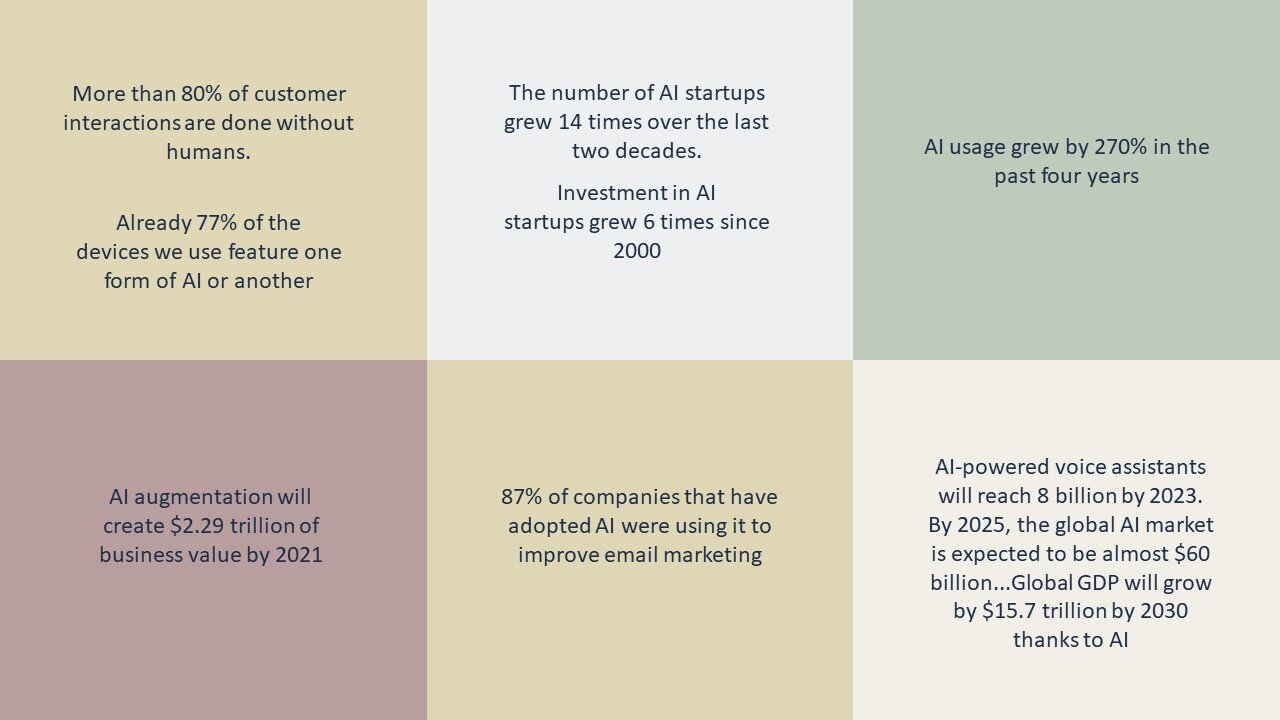Is artificial intelligence a move to transactional brands?
AI continues to be the dominant technology narrative of the moment
Conversational devices are the new norm. We have smart homes that can talk to us, self-driving cars, mirrors that can analyse our skin. Artificial Intelligence was once a fancy of science fiction, but today we are increasingly taking it for granted in our everyday lives.
The pace of technological advancement is so astounding that even our legal systems struggle to keep pace in mediating how these innovations can be used.
While things like AI can certainly create efficiencies in money and time, the impact of such tech doesn’t just make life easier but impacts our values, perceptions, and how we behave.
Source: Leftronic, 2019; Tech Jury Blog 2020
AI is no longer just a sci-fi dream, but a tool with clear societal impacts
With something so pervasive, it’s not surprising that it should influence how society functions. Various future scenarios and applications of AI have been suggested, from the more positive such as eradicating global poverty, to the more nefarious like the erosion of traditional socio-political structures due to autonomous weapons and cybercrime.
One of the main fears of AI is that it will take over jobs, rendering people useless. But more likely is that AI will replace more repetitive jobs, freeing us to pursue creativity that only humans are capable of.
Utilising AI so that we harness our valuable asset of creativity will change the way we learn, think, work, and participate in society.
“You don’t want to change habits so dramatically, deeply, and swiftly that it breaks the bonds that hold our society together…when these things happened slower in previous eras, we had more time to assess the impacts and adjust. That is simply not true anymore.”
– Michael Bess, Historian Of Science, Vanderbilt University
AI has the potential to fundamentally impact our values and behaviours
AI is streamlining the interpersonal
Many sci-fi stories have portrayed dystopian futures where humans are controlled by super intelligent tech. But according to Yale Professor Nicholas Christakis, the real threat to humans is how robots will alter our capacity for altruism, love, and friendship.
Technology is meant to make things better, faster, easier – in essence, it promises to streamline how we operate. This desire for efficiency bleeds into other areas of life outside technology, such as our human interactions.
Today’s AIs are ubiquitous and contain the potential and power to change the world in ways we can scarcely imagine, for better or worse. This exponential surge in AI has prompted an interest in ethics and ethical considerations for it.
Source: Digitlist Mag
Differences in Western vs. Eastern perspectives
Few countries in the world are embracing information as fast as China. Earning a reputation as a hot-house for digital innovation and experimentation.
Attitudes to privacy are different in China. Much information on citizens is centrally available to administrative authorities. But in the West, new technologies that collect, analyse and use vast amounts of data have alarmed consumers. This has led companies in the West to tread with caution. Inevitably, this has slowed innovation. But such concerns do not exist anything like the same level in China.
Source: EY
“[Culture and ethics] are an important part of the discussions about the role AI will play in our lives. What still needs to be discussed is whose ethics, and ultimately whose values, are being embedded in the AI. Is it transactional-west versus mythical-east, or is it American versus everyone else, or are we talking about cultural nuances?”
– Imran Khan, Digitalist
AI is already impacting our behaviour and shifting our relationships with brands
COGNITIVE WEBSITES WILL DRASTICALLY CHANGE BEHAVIOUR
The average spend of a buyer per session significantly increases on these websites. Cognitive sites take consumers through a smarter funnel, allowing them to buy before user fatigue starts to kick in.
CUSTOMERS WILL GROW USED TO MORE CONVENIENCE
Within COVID, online shopping has increased and consumers have already grown use to more convenience. AI is the next step. Face and fingerprint recognition speed up the purchasing process, whilst AI-driven voice detection technology will allow users to chat with digital assistants to solve problems.
CONSUMERS WILL BECOME MORE LOYAL
AI is able to use machine learning to uncover customer insights that encourage loyalty. AI can recommend products they’ll enjoy and the consumer is more likely to stick with that solution.
CUSTOMERS WILL TRUST BRANDS MORE
Businesses are taking transparency, honesty, and security very seriously to build bonds with their customers. The easiest way for brands to build trust with customers is by offering an exceptional amount of value in return for their customer’s details.
Source: Crobox blog, 2019
The future of shopping will be two-fold as AI takes hold
There will still be what might be termed ‘traditional shopping’, but a new phrase will enter the retail lexicon: transactional buying. Shoppers will no longer have to dedicate their time to repetitive purchases such as toilet paper, milk or washing powder. Instead, bots will complete the transactional purchase.
“It puts pressure on retailers and brands,” explained Kristina Rogers, EY Global Consumer Leader. “There are so many fast-moving consumer goods companies that are at risk of their brands becoming irrelevant.”
Source: Forbes, 2019
More than ever it is important to ensure that your brand is part of consumers’ mental availability as we move to this new model. Communications across multiple channels, disruptive and engaging brand stories and WOM will be key to ensuring brands remain relevant in this new world.
“The online-offline experience has to be completely nailed down because the consumer is everywhere. You need to understand where the consumer is dipping in and out, in these so-called ‘micro-moments’, and retailers do not have a good handle on that yet. Retailers will have to get creative about what their store looks like. It could be more gamified.”
- Kristina rogers, EY global consumer leader
AI’s role in ethics will continue to be explored and stretched, brands have an opportunity to help guide the altruistic future
WE VALUE TIME MORE THAN MONEY
Currently consumer choices involve complexity and stress, AI allows for choice curation and shopping purely for leisure and thereby they deal with brands that reflect their values.
CONSUMER BECOME BRAND EMBASSADORS
As consumers exchange their data for time efficiencies there is also an equitable exchange with ratings, reviews and opinions of brand performances. Hence the consumer has the potential to become the biggest advocate to influence behaviour.
AI WILL HELP US BECOME BETTER VERSIONS OF OURSELVES
As we have seen during COVID, AI has helped us become better versions of ourselves e.g. exercising, dieting, knowledge gathering etc. AI helps to assist us to keep on track to being a better version of ourselves.
AI ALLOWS US TO SCREEN OUT BRAND THAT DON’T REFLECT OUR VALUES
As our data and behaviour is collected, algorithms begin to build a profile of our values. This has the potential to have a direct correlation on how we see the world and the brands within it. In a world split by those with more altruistic values, versus those with more protectionist values, it will be up to brands to help guide the cultural narrative of future behaviour and ethics.
Source: EY, 2020
Growing up with Alexa will influence the next generation of kids
Generation Alpha has been coined Generation Voice by the conversational AI community. Adults have been incorporating voice assistants into the lives of their kids every day, with 22% of parents considering them to be part of the family – taking on the role of playtime moderator to bedtime facilitator.
Source: Media Post
This is the first generation to grow up with omnipresent AI. With every question, demand and purchase fulfilled by a simple command, how will these children learn to interact with other people, and how will it influence their development?
Children’s relationships to voice assistants are extremely personal because they tend to anthropomorphize them and form unique bonds with the object. They also see these gadgets as having emotions and capable of thought and friendship.
Source: Washington Post
But what’s lacking is a true back and forth dialogue, going off on tangents, and storytelling that is so crucial to learning, and that parents are so well equipped at teaching.
The role of story telling is still key for brands as they attempt to engage future generations, however the traditional modes of story telling will potentially be replaced with gamified story arcs.
Source: Roberto Parada, The Atlantic
There are some things AI simply cannot replace
AI can be a useful tool in sorting and synthesising data. It is a force for good that can be leveraged to a certain degree in the insights industry. But while it can tell you what people are saying, it isn’t able to accurately determine what people are feeling and why.
Sentiment analysis unearths people’s underlying motivations and emotions and takes into account the wider context in which people are expressing themselves and their subsequent values and behaviours.
Qualitative researchers have been likened to anthropologist. Seeking and wanting to understand people and their individual environments. This method is driven by the recognition that it’s important to uncover and understand each person’s unique lifestyle, behaviour and attitudes requires work and relationship building.
Creating rapport, a safe and comfortable space to talk, acknowledging the awkward fidget or when someone’s eyes light up, and at times are challenged to dig deeper or think more conceptually.
Qualitative research is a craft that needs to be honed and requires a superior level of emotional intelligence, something AI has not achieved as yet!
Summary of key insights
1.
AI is a disruptive technology touching all facets of our lives
It is imperative for brands to begin understanding how they can make the most of the AI revolution
2.
There are many ethical implications of AI on the individual and society
Getting accustomed to a ‘friction’ mode of navigating life means customers will expect brands to have a strong sense of purpose and altruism to help them navigate this world
3.
AI may move from an assistant to a partner and caregiver role
How can brands tap into this new level of human-computer relationship? How can your brand integrate your offerings and knowledge with this technology to further help people in their day to day?
4.
Brands share of mental availability is key in this new transactional world
As the retail environment accelerates to a more transactional model, now is the time to continue communicating your brand to drive the imprints and capture their attention in micro-moments
5.
Dominant and emergent cultural tensions need to be addressed in AI
As we see with the emergence of gender-neutral voice, we will also see developers tackling inequality, race relations and the other core narratives emerging. Your brand can make a stance!
6.
The divide widens between purpose v. transactional brands
Cutting through and differentiating your brand in this world will mean brands that have a strong sense of purpose, a clear point of view (sometimes controversial) will be respected and standout.



